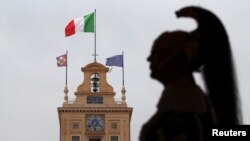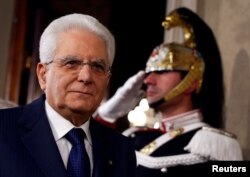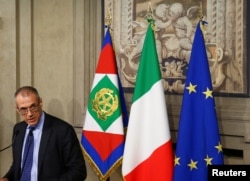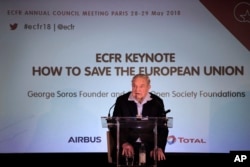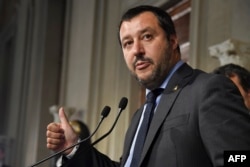Europe's financial markets are in a swoon, Italy is in political turmoil, a fresh eurozone debt crisis is in the offing and the continent's euroskeptic populists are predicting gleefully the fast-approaching demise of the European Union.
So, what's new?
For the past few years, all of the above could have been written virtually any day of the week, much of it fueled by hyperbole. But the political drama unfolding in Italy is of a different order and shaping up to be a much greater existential threat to the European Union than Britain's Brexit vote two years ago, analysts say.
That is unless Italy can gain firmer political ground, and quickly.
"Italy is, not for the first time, in political crisis," said Nick Ottens, chief editor of the transatlantic opinion website Atlantic Sentinel. "But this time, what happens in Rome could have a big impact on financial markets, the euro, and the longer-term future of the European Union as a whole."
Tuesday, the global financial markets saw massive sell-offs of European equities and bank stocks, and currency traders dumped the euro, sending it plummeting to its lowest level against the dollar in nearly a year. Bond markets also swooned as global investors headed for the safety of U.S. Treasury securities, reviving memories of the debt crisis that bankrupted Greece and threatened to fracture the eurozone.
The sell-off came as Italian politicians struggled to shape an orderly way toward fresh elections after Sergio Mattarella, Italy's president, vetoed the selection of an anti-euro finance minister by the anti-establishment Five Star Movement (M5S) and anti-immigrant Lega. That collapsed the nascent coalition government and prompted the resignation of the prime minister nominee after just 90 hours — a stunning turnaround even by Italy's chaotic political standards.
Mattarella's decision to turn to a former IMF economist, Carlo Cottarelli, to head a caretaker government remains beset by problems. The president's plan appears to have involved delaying elections until next year.
But Cottarelli, a Europhile, isn't expected to win a vote of confidence in the Italian parliament because of opposition from the two populist parties, who together command a parliamentary majority, forcing Mattarella to call a populist-demanded early election, possibly as soon as July.
'On Verge of Panic'
The Italian political turmoil is sending shock waves across Europe amid alarm the country is on a political trajectory to exit the eurozone, despite polling data suggesting Italians would prefer to stick with the euro, although they remain resentful of Brussels and EU-dictated austerity policies.
"On Verge of Panic," was how the normally sober Economist magazine headlined its coverage Wednesday of the political crisis in Rome and what it may entail for Europe.
Brinkmanship and miscalculation by both old guard politicians in Italy and upstart populists risks worsening the Italian domestic crisis and transforming it into a continent-shaking European one, analysts and investors warn.
On Tuesday, Hungarian-American billionaire George Soros said he feared the European Union could be heading toward another major financial crisis triggered by populist political parties intent on ripping the bloc apart. "The EU is in an existential crisis. Everything that could go wrong has gone wrong," he said in a speech in London.
Italy is the third-largest country in the eurozone, the fifth-largest in the European Union, and as one of its founding members, conflict with Brussels will test the bloc far more than Brexit.
'Italian democracy's darkest night'
EU officials fear the Italian populists will grab an even bigger share of the popular vote in rerun parliamentary elections and only four months after Italians voted in a bad-tempered national poll, marred by violence, that resulted in a hung parliament.
"The political risk is becoming very complex," said Mauro Vittorangeli of Allianz Global. "The political situation is totally unpredictable," he added.
Lega leader Matteo Salvini intends to frame his party's election campaign as a referendum on Italy's EU relationship, arguing the populists' plan for a coalition government failed because of interference from the "powers-that-be, the markets, Berlin and Paris" who want Italy to be "a slave, scared and precarious."
A poll released last week suggested 61 percent of Italians believe their voice isn't being heard in Brussels. Pollsters put the Lega's support at 22 percent, five points up from its vote share in March's election.
Likewise, M5S leader Luigi Di Maio, whose party won 32 percent of the March vote, is also blaming entrenched elites, foreign and domestic, for crashing the proposed populist coalition government. He has called on party supporters to attend to protest Mattarella's actions, which he says amount to "Italian democracy's darkest night."
One thing that may hurt the populists and reduce their electoral support, argues economist Alberto Mingardi of the Istituto Bruno Leoni research group, is if voters start fearing "an impending financial disaster." Or if Italians decide the populists are more to blame for the crisis than Italy's president.




